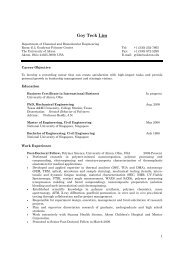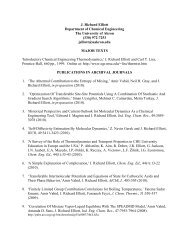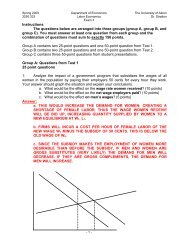Sociology of the Anarchists - Gozips.uakron.edu - The University of ...
Sociology of the Anarchists - Gozips.uakron.edu - The University of ...
Sociology of the Anarchists - Gozips.uakron.edu - The University of ...
Create successful ePaper yourself
Turn your PDF publications into a flip-book with our unique Google optimized e-Paper software.
domestic workers. Of course, anarchists would like to see all <strong>the</strong>se “normal” dynamics<br />
done away with, but <strong>the</strong>y understand that <strong>the</strong>y are not mere accidents and that <strong>the</strong>y<br />
continue to exist because many people/institutions ei<strong>the</strong>r directly benefit from <strong>the</strong>m or<br />
have no desire to expend <strong>the</strong> effort to end <strong>the</strong>m.<br />
Durkheim's Elementary Forms <strong>of</strong> Religious Life (year?) <strong>of</strong>fers anarchists insight into <strong>the</strong><br />
reverence held for objects endowed with special meaning—for example flags, corporate<br />
logos (and <strong>the</strong> windows <strong>the</strong>y appear upon), swastikas, etc.—and signify some sort <strong>of</strong><br />
solidarity. Thus, anarchists ought to view <strong>the</strong>se things as poor conclusions made by<br />
o<strong>the</strong>rwise needing people. He sees two kinds <strong>of</strong> forces in society, <strong>the</strong> pr<strong>of</strong>ane and <strong>the</strong><br />
sacred. Inanimate (or pr<strong>of</strong>ane) objects such as flags can be transformed from pieces <strong>of</strong><br />
cloth to sacred objects and become part <strong>of</strong> <strong>the</strong> collective conscience. Durkheim thinks<br />
<strong>the</strong>se symbols are necessary to retain society (by reminding individuals <strong>of</strong> <strong>the</strong> group).<br />
Often, <strong>the</strong>y become more than mere representations <strong>of</strong> <strong>the</strong> collective conscience and<br />
become a part <strong>of</strong> it. That is why <strong>the</strong>re is such strong reaction towards burning <strong>the</strong> flag or<br />
ripping up a Bible; it is as if someone were burning America or ripping up Christianity<br />
itself!<br />
<strong>Anarchists</strong> also might see <strong>the</strong> similarities in <strong>the</strong> microcosm <strong>of</strong> <strong>the</strong> movement, such as that<br />
placed upon symbols such as <strong>the</strong> “circle-A” or <strong>the</strong> black flag. Of course, this is a<br />
generalization—and slight over-exaggeration—but a similar pr<strong>of</strong>ane-to-sacred<br />
transformation even occurs in anarchist circles. An additional interpretation <strong>of</strong> this may<br />
be seen by action by <strong>the</strong> black bloc to smash corporate windows in order to destroy <strong>the</strong><br />
illusion <strong>of</strong> power/ubiquitousness <strong>the</strong>se symbols exert. A symbolic action against a<br />
symbolic object.<br />
<strong>The</strong> process <strong>of</strong> giving up individualism for group solidarity should inform anarchists to<br />
<strong>the</strong> functioning <strong>of</strong> ultra-nationalism, religious fundamentalism, and corporatism. People<br />
<strong>of</strong>ten feel obligations to <strong>the</strong> whole, and thus sanction <strong>the</strong>mselves. <strong>The</strong>y give in, respect<br />
society, and gain a sort <strong>of</strong> moral/mental energy. According to Durkheim, this<br />
internalization allows people to “become” Americans or whatever. In fact, this can be<br />
extended to nearly any sector, demographic, and organization where people identify<br />
with/as something and thus must “give up” <strong>the</strong>ir individuality. <strong>Anarchists</strong> recognize while<br />
<strong>the</strong>re is nothing inherently bad in giving up some individualism for <strong>the</strong> collective, that it<br />
should not be done naively or uncritically. Fur<strong>the</strong>r, to identify too strongly with a group<br />
<strong>of</strong>ten leads to future rejection <strong>of</strong> immoral behavior by <strong>the</strong> group.<br />
Marcel Mauss and Henry Hubert wrote <strong>of</strong> <strong>the</strong> idea <strong>of</strong> “mana”, which is a spiritual force<br />
that people all possess. <strong>The</strong>y thought that individuals will sometimes expropriate<br />
collective sentiments for personal gain. Even though is <strong>of</strong>ten considered in a religious<br />
context, it can also be applied economically or politically. For instance, a politician can<br />
exchange <strong>the</strong>ir extreme patriotism (and ability to sway politics) for votes or campaign<br />
contributions, just like a televangelist exchanges <strong>the</strong>ir extreme religiousness (and ability<br />
to pray well) for money. Collins (1994, p?) notes that this is similar to Weber's notion <strong>of</strong><br />
charisma. Is this where “leadership” comes from? And if so, what does this imply for<br />
anarchist organizations which claim (sometimes incorrectly) to not have leaders—or at<br />
least bosses?<br />
[ Williams 31 ] [ this is a draft. do not cite. ]






